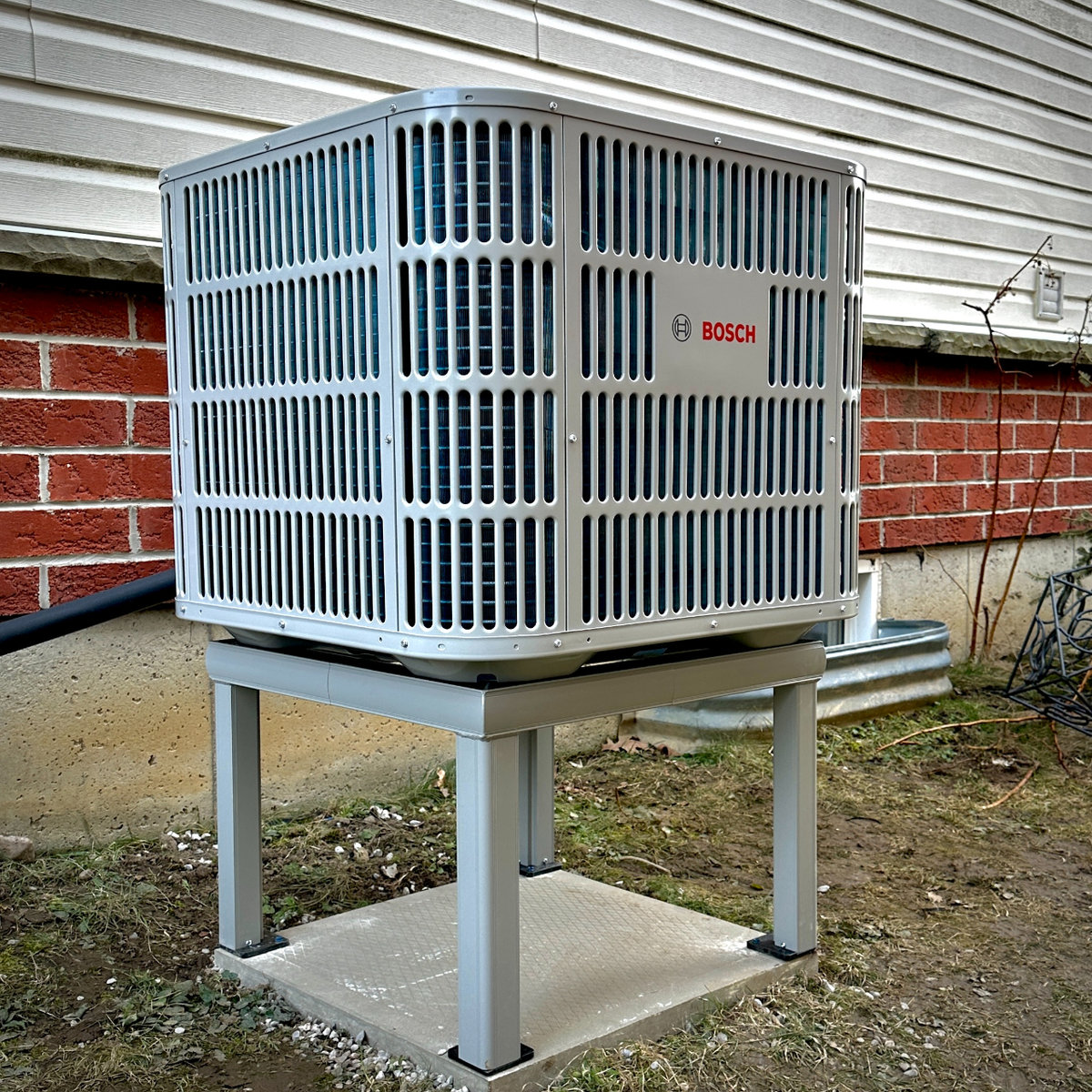
We collect basic website visitor information on this website and store it in cookies. We also utilize Google Analytics to track page view information to assist us in improving our website.
Heat pumps are a proven technology that has been used for decades, both in Canada and globally, to efficiently provide heating and cooling. Heat pumps can increase your home’s energy efficiency, and help reduce heating and cooling expenses by circulating hot air from one place to another.
Depending on the season, this means moving hot air out of your home in the summer, and warm air into your home during the winter. Heat energy exists even in cool air, so these heat pump systems can operate year-round in many climates.
Here, you can find information about the benefits of heat pumps systems, heat pump rebates, heat pump cost estimation with our calculator, answers to common questions about heat pumps in our FAQ, and details about our maintenance and protection plans.
A heat pump is a device that is used for heating and cooling spaces by transferring heat from one location to another. It operates on the principle of moving heat from a lower-temperature source to a higher-temperature space, which is the opposite of how a traditional furnace or air conditioner works. Heat pumps are energy-efficient and environmentally friendly because they can provide both heating and cooling without burning fossil fuels.
It uses a refrigeration cycle to accomplish the heat transfer. The basic components of a heat pump system include an evaporator coil, a compressor, a condenser coil, and an expansion valve.
In the heating mode, the heat pump begins by evaporating a refrigerant (a special fluid) at a low temperature within the indoor coil or evaporator. As the refrigerant evaporates, it absorbs heat from the indoor air, causing the air to cool down.
The low-temperature, low-pressure vaporized refrigerant is then compressed by a compressor. This compression increases the refrigerant's temperature and pressure significantly. As a result, it becomes a high-temperature, high-pressure gas.
The high-temperature, high-pressure refrigerant gas is then transported to the outdoor coil or condenser coil. In the condenser coil, the refrigerant releases the heat it absorbed from the indoor air. This process causes the refrigerant to condense and turn back into a liquid.
After the condensation process, the high-pressure liquid refrigerant passes through an expansion valve or an expansion device. This valve reduces the pressure and temperature of the refrigerant, turning it into a low-pressure, low-temperature liquid-gas mixture.
Heat pumps are an increasingly popular choice for heating and cooling homes, and for good reason. These systems use electricity to transfer heat from the outside air or ground to warm your home in the winter and to remove heat from your home and transfer it outside during the summer.
One of the main benefits of heat pumps is their energy efficiency. Unlike traditional heating and cooling systems, heat pumps don’t create heat, they simply move it from one place to another. This means that they can deliver up to three times more energy than they consume, making them a highly efficient way to heat and cool your home.

In addition to heat pump energy efficiency, they also offer a number of other benefits. Heat pumps can provide both heating and cooling in a single unit, which can save space and installation costs. They can also operate quietly and require less maintenance than traditional HVAC systems.
With a focus on reducing energy consumption and transitioning to more sustainable energy sources, heat pumps are becoming an increasingly important part of the future of HVAC. As technology continues to advance and energy efficiency standards become more stringent, we can expect to see even more innovative heat pump solutions being developed to help homes and businesses reduce their carbon footprint and save on energy costs.

Heat pumps are a versatile and energy-efficient solution for maintaining comfortable indoor environments, offering a lot of advantages that make them a popular choice for heating and cooling homes and commercial buildings.
Efficient: Heat pumps are highly energy-efficient because they move heat rather than generating it by burning fossil fuels. In heating mode, they can provide up to three times more heat energy than the electrical energy they consume, resulting in significant energy savings.
Lower Energy Bills: Due to their efficiency, heat pumps can lead to lower monthly heating and cooling bills compared to traditional HVAC systems that rely on gas furnaces or electric resistance heaters.
Environmentally Friendly: Heat pumps produce fewer greenhouse gas emissions compared to systems that burn fossil fuels for heating. They help reduce the carbon footprint of buildings and contribute to a more sustainable environment.

The Canada Greener Homes Grant is a federal program that helps homeowners make energy-efficient upgrades to their homes, including heat pump installation.
At Advance Heating & Cooling, we are proud to be a participating contractor in this program. Through the grant, eligible homeowners can receive up to $6500 in grants to cover the cost of installing a new heat pump.
Advance Heating and Cooling will provide you with a FREE no-obligation estimate with recommendations to make your home greener.
Advance Heating and Cooling will arrange for your energy audit. The Energy Advisor will guide you through the required paperwork.
Our team of professionals will install your Heat pump system in your home.
The Post Energy Evaluation will be scheduled by your Energy Advisor and then completed to confirm installation and rebate qualification.
Rebate arrives approximately 6 months after the Post Energy Evaluation.
Need more info? Check out our blog post, “Canada Greener Homes Grant 2023”
Enbridge Gas and Canada's Greener Homes Grant have teamed up to offer rebates for home retrofits like:
The Home Efficiency Rebate Plus program aims to boost energy savings for Ontarians, particularly benefiting Enbridge Gas customers who can receive rebates of up to $10,000. Additionally, participants can get a $600 rebate to offset the cost of their EnerGuide home evaluation.
The cost of a heat pump can vary significantly based on several factors, including the type of heat pump, its size, efficiency, and installation requirements.
The type of heat pump you choose, such as air-source, ground-source (geothermal), or ductless mini-split, will impact the initial cost. Ground-source heat pumps tend to be more expensive due to the excavation and installation of ground loops or wells.
The size of the heat pump you need depends on the heating and cooling load of your space. Larger units with higher capacity will generally cost more than smaller ones.
Heat pumps come with different efficiency ratings, often measured in terms of SEER (Seasonal Energy Efficiency Ratio) for cooling and HSPF (Heating Seasonal Performance Factor) for heating. More efficient units typically cost more upfront but can lead to lower long-term operating costs.
Installation costs can vary based on factors like the complexity of the installation, the need for ductwork modifications, and labour costs in your area. Ground-source heat pumps may require more extensive installation work, driving up the overall cost.
Get a complimentary and instant estimate of the cost of a new heat pump system.
Heat pumps transfer heat and are more energy-efficient, environmentally friendly, and suitable for both heating and cooling, while furnaces generate heat, often have lower upfront costs and are preferred in colder climates. For more information, check out our blog post "Furnaces vs. Heat Pumps - Which Is the Right Choice for You?"
Heat pumps are an efficient and cost-effective way to heat and cool your home or business. However, like any other HVAC system, they require regular maintenance to ensure optimal performance and longevity.
At Advance Heating & Cooling, we offer comprehensive heat pump maintenance services to help keep your system running smoothly.
Our technicians will clean and inspect the coils, check the refrigerant levels, inspect the electrical connections, test and calibrate the thermostat, and more. With regular heat pump maintenance, you can ensure that your heat pump is operating efficiently and effectively, saving you money on energy costs.
In addition to routine heat pump maintenance, we also offer emergency repair services for heat pumps. Our team is available 24/7 to respond to any issues that may arise, from a simple repair to a complete system overhaul. With our expertise and commitment to quality, you can rest assured that your heat pump is in good hands.
$12.99/month, per unit
annual 21-point inspection
Inspection of the furnace heat exchanger
Cleaning or replacement of the air filter
Inspection of the blower motor and fan
Inspection and clean the burner assembly
Testing of the defrost control system
Inspection of the refrigerant level and pressure
Verification of the electrical connections and wiring
Testing of the furnace's safety controls and limit switches
Inspection and cleaning of the indoor and outdoor coils
Inspection and cleaning of the drain pan and condensate drain line
$24.99/month, per unit
unlimited free service calls
combustion test ( on furnace )
annual 21-point inspection
Inspection of the furnace heat exchanger
Cleaning or replacement of the air filter
Inspection of the blower motor and fan
Inspection and clean the burner assembly
Testing of the defrost control system
Inspection of the refrigerant level and pressure
Verification of the electrical connections and wiring
Testing of the furnace's safety controls and limit switches
Inspection and cleaning of the indoor and outdoor coils
Inspection and cleaning of the drain pan and condensate drain line